When Zahra Wafa thinks about what it took to put her daughters through school, her face hardens.
She remembers the days she and her husband ate only bread to afford their children’s education, how it had all seemed worth it to give them a chance at a future beyond Nawa Foladi, a village in central Afghanistan with a single dirt track, hand-pumped wells and no electricity.
Then Wafa remembers the new reality under the Taliban, and her voice falters at the thought that it might all have been for nothing.
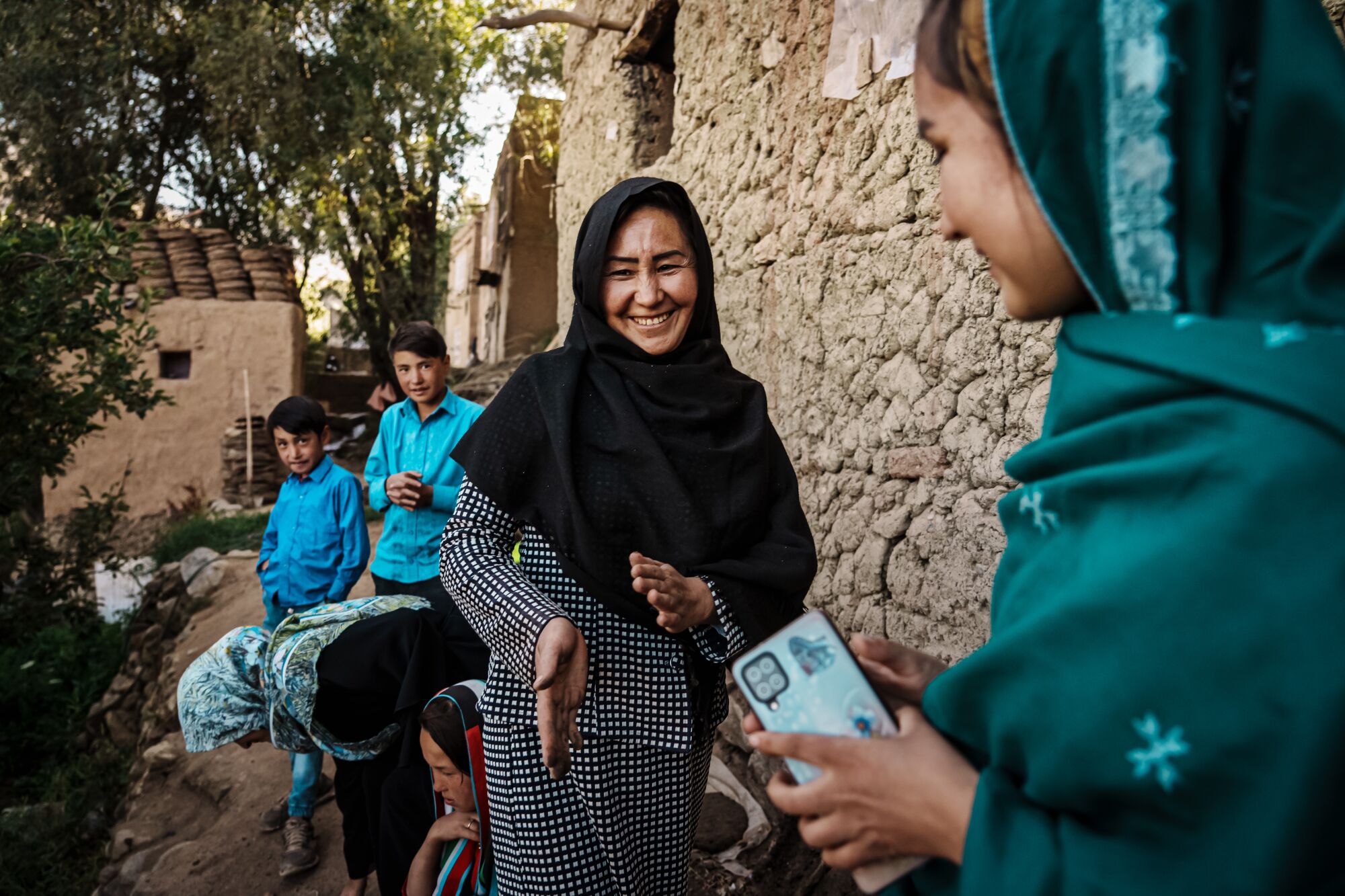
Zahra Wafa, center, leads her daughters with chores at their home in Nawa Foladi, a village near Bamian, Afghanistan.
(Marcus Yam / Los Angeles Times)
“We worked hard, spent so much money on this and they’re so intelligent. And now they’re supposed to just sit at home?” she said. “Every time I think about it I get a headache.”
A year after the precipitous fall of the U.S.-backed republic and the Islamic militants’ ascension to power, Wafa and her daughters, like so many women and girls across Afghanistan, are grappling with the Taliban’s hard-line vision for the country and its plan to turn back the clock not only on their education but their very presence in public life.
The group claims it has no interest in restoring its 1990s regime, when girls were banned from school and almost all jobs, and endured corporal punishment for violations such as not wearing a burqa in public. Yet every few months, new decrees are issued about which careers women may have, how far they may travel without a male guardian and what they may wear outside the home. One edict said the most devout women would not leave the house at all, unless there’s need.
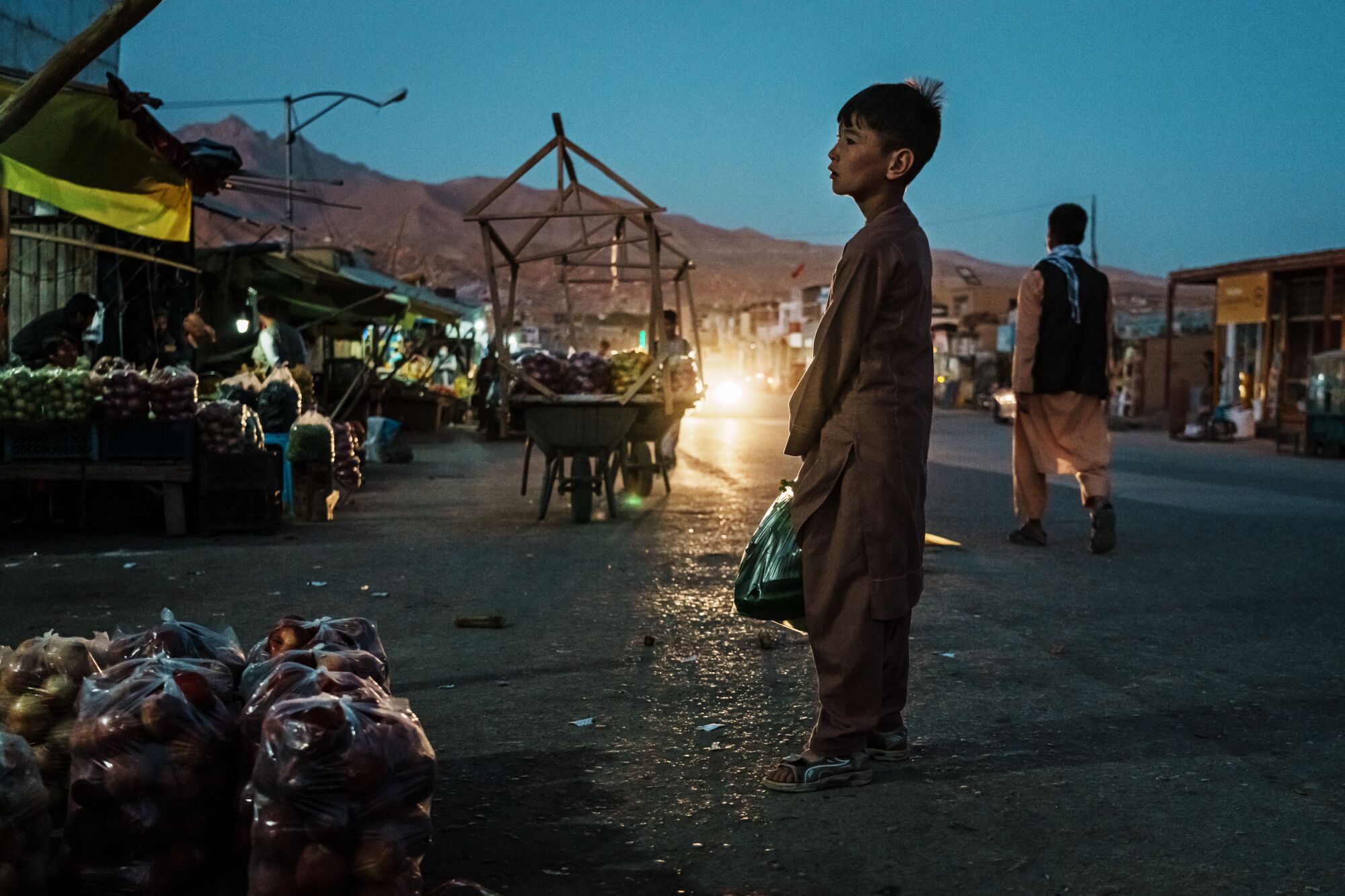
Afghans go about their evening, where few women are seen after sundown, on the main thoroughfare in downtown Bamian.
(Marcus Yam / Los Angeles Times)
Earlier this month, the Afghan Ministry for the Propagation of Virtue and Prevention of Vice — which occupies the building that once housed the Women’s Affairs Ministry — ordered women to be banned from entering amusement parks. A few days later, it banned them from gyms and hammams, public baths that were already segregated by sex.
Secondary schooling has been an especially sore point. In the fall of last year, authorities allowed Afghan girls to enroll in primary schools and universities and promised to resume secondary education at the start of the new school year March 23. But that day, as high school girls streamed into classrooms, officials reversed course and postponed classes indefinitely until “a comprehensive plan has been prepared according to sharia and Afghan culture.”
Last month, they allowed female students who were in 12th grade before the republic’s collapse to take the university placement exam known as the Kankor — but blocked off majors they deemed inappropriate for young women to pursue, including economics, engineering, journalism and veterinary medicine.
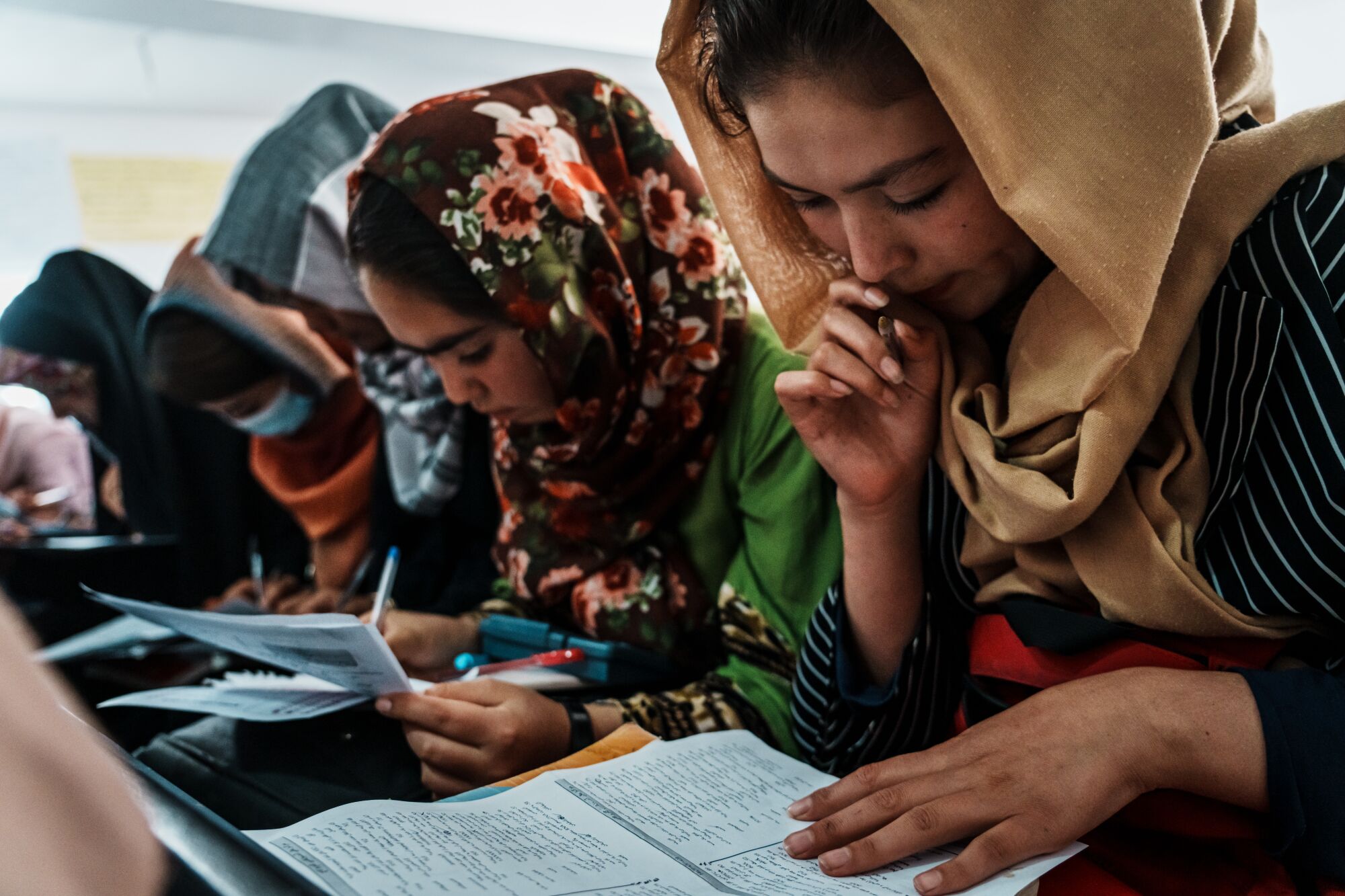
Students are preparing and studying for the Kankor exam at a private tutoring center in Bamian, Afghanistan, on Sept. 23, 2022.
(Marcus Yam / Los Angeles Times)
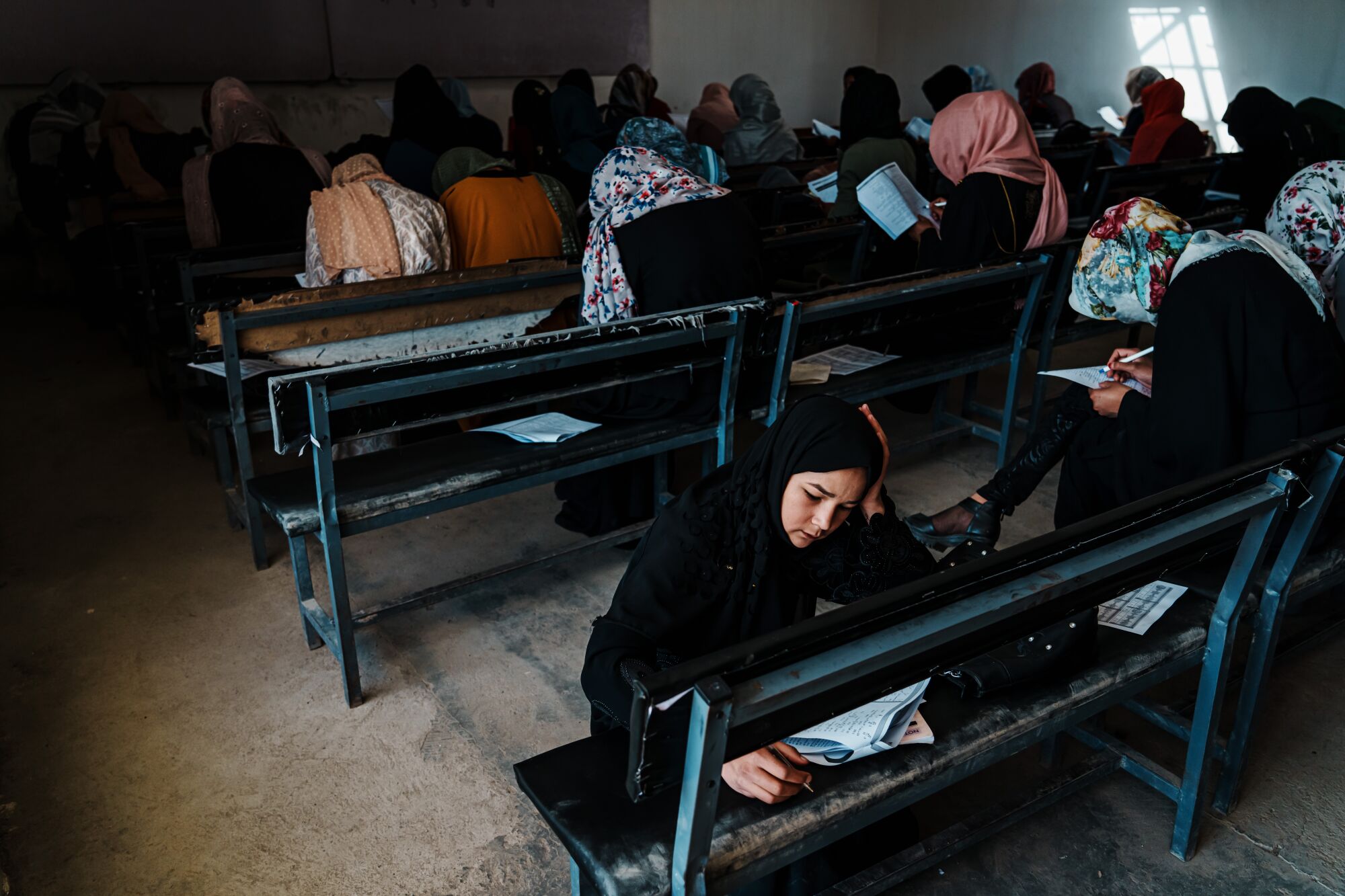
Afghan girls attend a religious school, the only permitted form of education for girls between sixth and 12th grade, at Hawza Elmya Mahdia Madrasa in Bamian, Afghanistan.
(Marcus Yam / Los Angeles Times)
The intransigence toward girls’ education has had material consequences in one of the world’s poorest countries. International aid groups, which now provide assistance to roughly half of Afghanistan’s population, see the reversal on secondary education as an inflection point that has affected donors’ willingness to give. Western governments had long claimed women’s rights as a primary justification for their occupation of Afghanistan and pointed to advances for women as a rare bright spot in their 20-year experiment in nation-building.
Even Afghan businessmen living abroad who were interested in returning to their homeland or had already come back to take advantage of the lowest level of fighting in 40 years changed course.
“Before that decision there was optimism. People started feeling late last year that things were going in a safe, good direction. But when they reversed the school opening, it was a game changer,” said Sulaiman Bin Shah, a former official at Afghanistan’s Ministry of Commerce and Industry who still lives in Kabul.
“All the energy that was built, it went down. Donors, they stopped their plans. People who had investment plans for the spring, they also have kids and want them educated, so they stopped everything, took their families and left.”
In the face of international opprobrium, Taliban officials insist that they’re applying Islamic law and that the West, rather than genuinely caring about women’s rights, is using them as a cudgel to punish the group for winning the war. They point out that the country is the most peaceful it has been in decades, meaning that more children — including girls — are able to go to school and that the emirate they’ve built over the remains of the vanquished republic better reflects what most Afghans want.
That last point is perhaps true in the southern, more conservative parts of the country, such as Kandahar, where the Taliban first arose.
But other areas imposed a less cloistered life on women under the U.S.-backed republic, offering freedoms that many embraced.
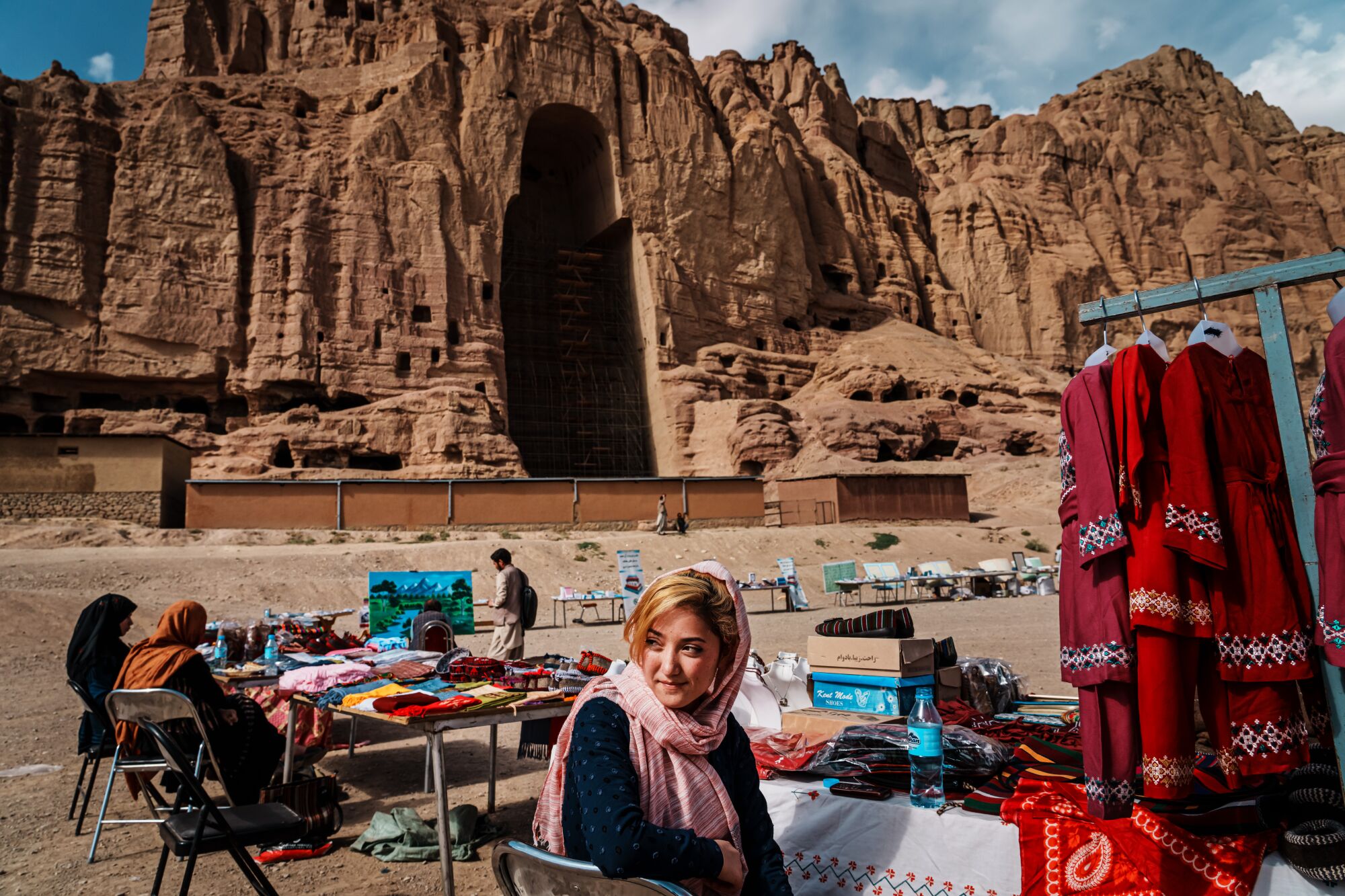
Narges Razuli, 16, works in a makeshift outdoor bazaar in Bamian, Afghanistan. Narges takes daily English classes and aspires to become an entrepreneur, but says she can’t plan for her future because she’s not allowed to finish school officially.
(Marcus Yam / Los Angeles Times)
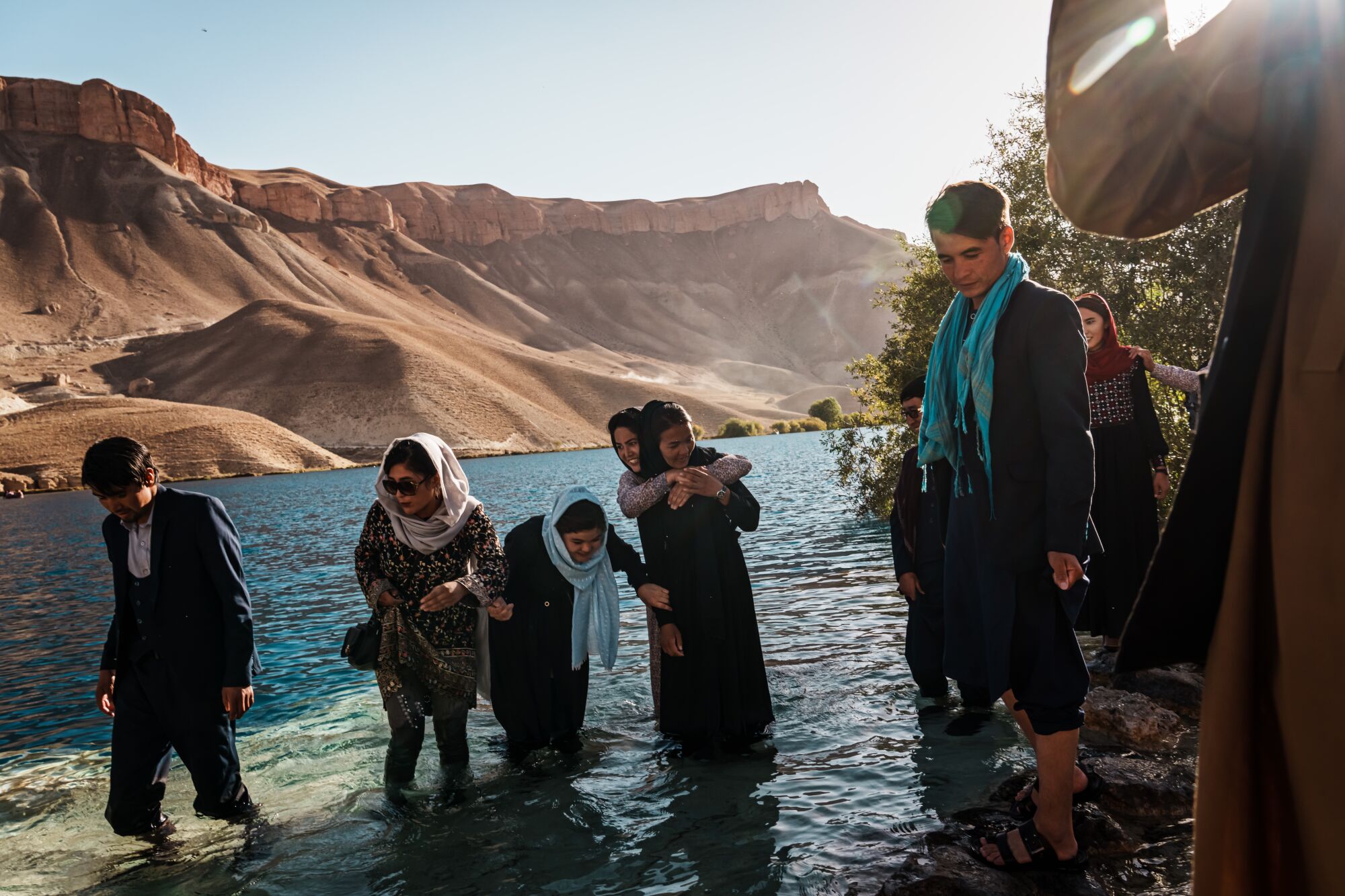
A group of friends, all college students from Ghor province, visit Band-e Amir National Park, a popular tourist attraction near Yakawlang in central Afghanistan in September 2022.
(Marcus Yam / Los Angeles Times)
Bamian, a breathtakingly beautiful central Afghan province dominated by the Hazara, a mostly Shiite Muslim minority that has faced persecution from the Taliban, wholeheartedly enlisted in America’s project. Rather than monochromatic full-body coverings, women here wore colorful headscarves and even now still dare to show their faces on the street, despite the occasional admonishment from the Taliban’s morality police. During the republic’s time, they took full advantage of the opportunities afforded by the U.S.-led invasion to become doctors, lawyers, soldiers and journalists.
Wafa now contemplates the loss of all that. Her eldest, 20-year-old Meena Ibrahimi, had finished 12th grade before the Taliban takeover; she planned to study law and aspired to become a member of parliament or a diplomat representing Afghanistan at the United Nations.
“Of course none of that will happen now,” Ibrahimi said.
She had waited for more than a year to take the Kankor, but didn’t bother applying for law or anything else not related to medicine, one of the few fields open to women under the Taliban.
“The Taliban don’t care about the constitution or women’s rights. If the situation continues, those who study law won’t be employed,” she said.
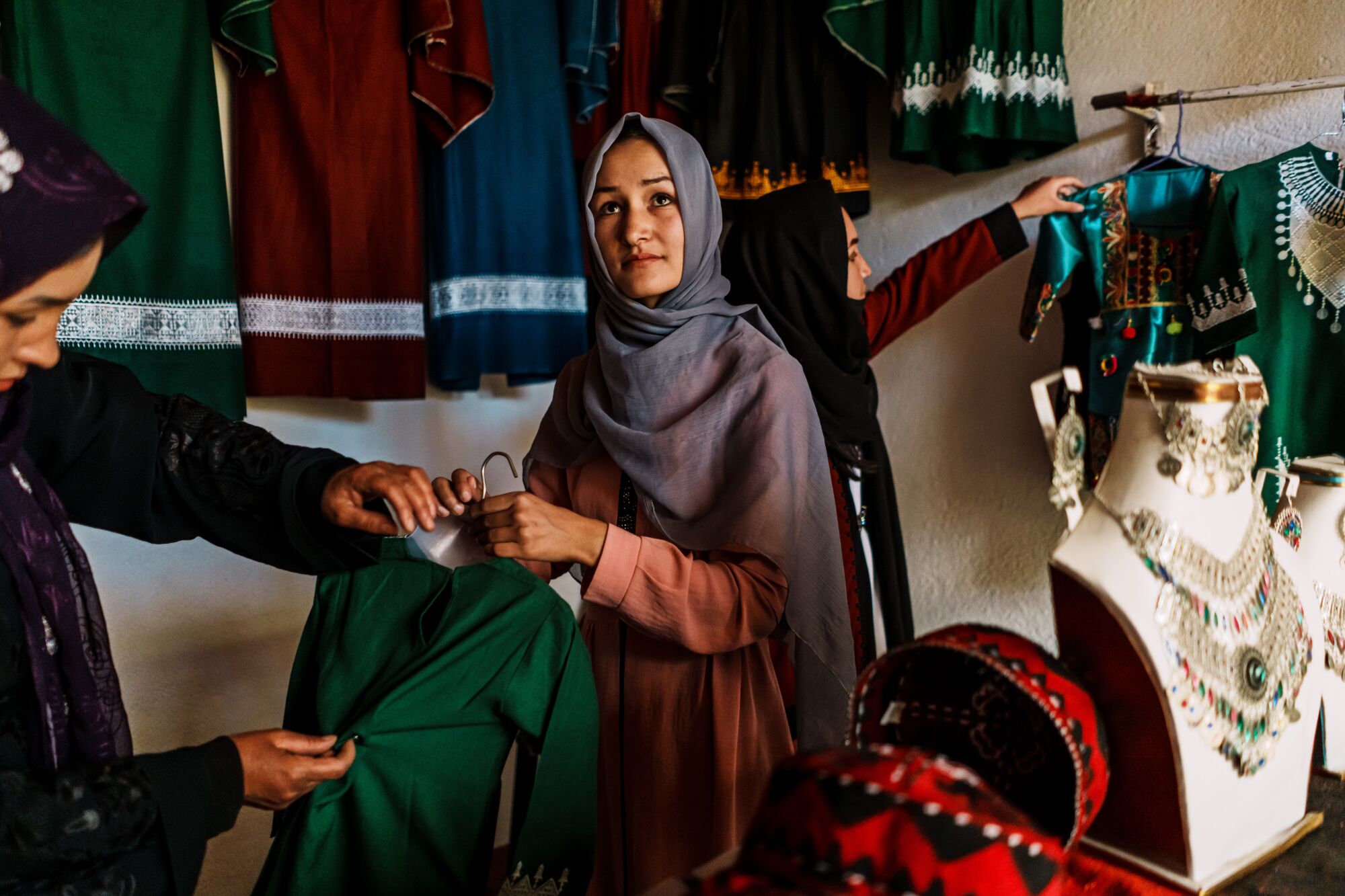
Meena Ibrahimi, 20, center, helps her mother, Zahra Wafa, left, and her sister Zainab at their handicrafts shop in Bamian’s central bazaar.
(Marcus Yam / Los Angeles Times)
At least she wasn’t in limbo like her sister Zainab. A 16-year-old 10th-grader, Zainab hoped to be a doctor, an achievable dream if it were possible to finish her secondary schooling. But with those schools shuttered, Ibrahimi’s class will be the last cohort of Afghan girls and young women to enter university.
“The first time the Taliban took over, it was my mother who had to bear the consequences. Now, 20 years later, we’re suffering the same thing,” Ibrahimi said, glancing at Wafa, who looked at the floor, a tight frown on her face and tears slowly filling her eyes.
Wafa sighed, then said: “When the Taliban were defeated the first time, I thought they would never return. It was like a new world.”
The newfound freedom after the first Taliban regime fell, in 2001, drove her and her husband, Mohammad Ibrahim Mohammadi, a 46-year-old farmer and laborer, to do all they could to ensure their children — two daughters and three sons — had an education.
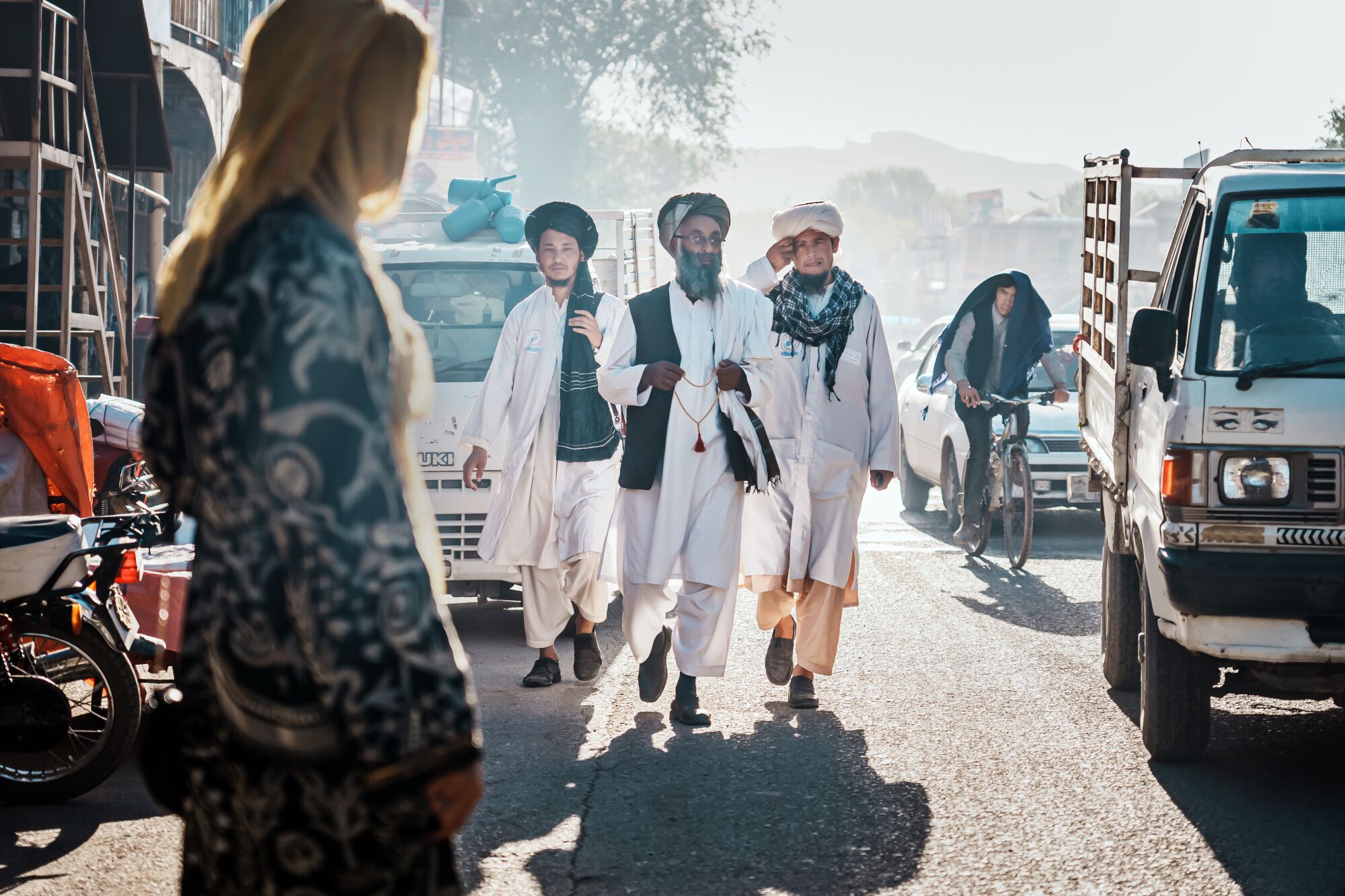
Taliban morality police patrol the streets to enforce dress codes in Bamian, Afghanistan.
(Marcus Yam / Los Angeles Times)
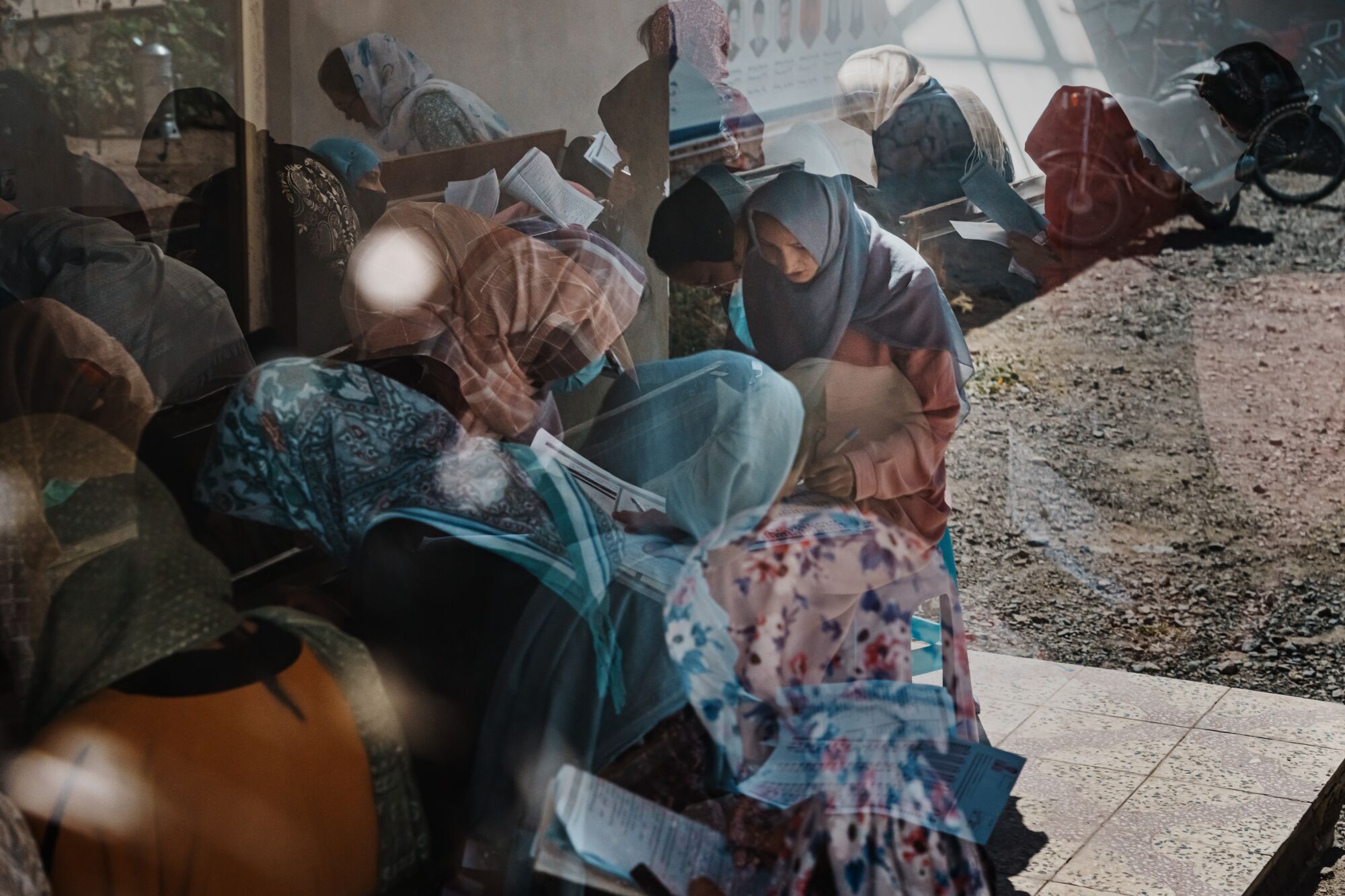
Meena Ibrahimi, 20, center, and other students study for the Kankor exam at a private tutoring center in Bamian, Afghanistan.
(Marcus Yam / Los Angeles Times)
That’s still true. After the Taliban takeover, Wafa rented a room in Bamian city for her daughters and enrolled them in private English courses, which cost 500 afghanis (almost $6) per month. Computer classes were too expensive, she said.
To afford it, Wafa wakes up most mornings shortly after daybreak, hikes 30 minutes from Nawa Foladi till she reaches something resembling a road, catches a taxi for the hourlong trip to her handicrafts shop in the city’s central bazaar and works all day before returning home by late evening to prepare food over a stove heated with cow-dung patties and wash clothes in a nearby brook.
In former times, the shop had brought her 25,000 afghanis a month, some $300. These days she makes less than a third of that, and covering her children’s education takes at least a quarter of her earnings.
“I have to work because of my family,” she said, adding that her husband was in charge of the family expenses but it was her income that covered the schooling of their children.
Rather than wait for the central government to have a change of heart about secondary education for girls, teacher and activist Taiba Rahim has chosen to seek compromise solutions with local Taliban officials, especially in parts of the country where they have less support for their austere interpretation of Islam. She leads Nai Qala, an education-focused organization that builds schools and trains teachers in rural areas, mostly in the central and northern provinces.
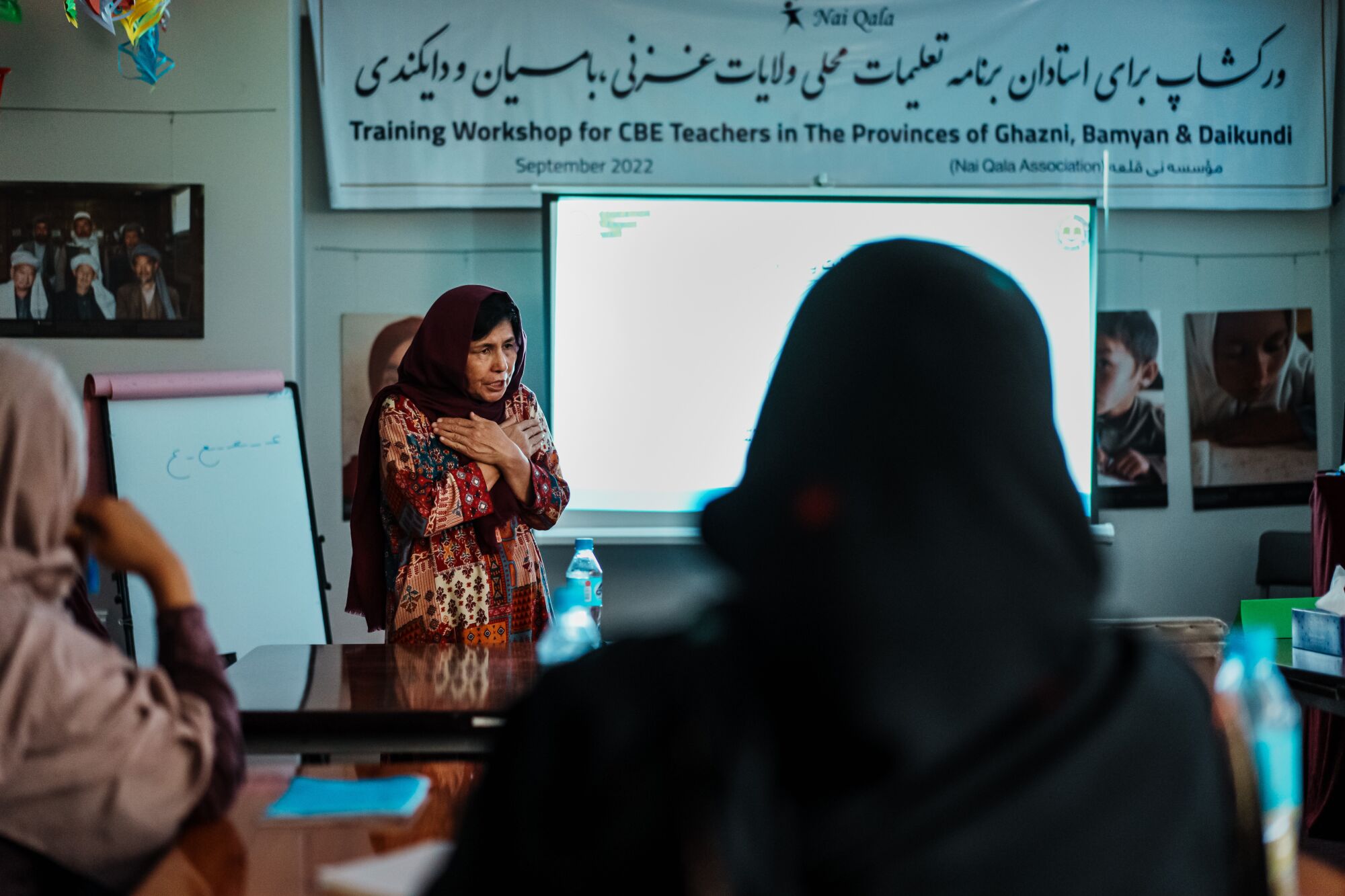
Taiba Rahim, left, runs a team-building exercise in Kabul with participants. She leads Nai Qala, an education-focused organization that builds schools and trains teachers in rural provinces of Afghanistan.
(Marcus Yam / Los Angeles Times)
In May, it opened its most recent project, a six-classroom school serving students ages 7 to 16 — including girls. It was a victory that Rahim said came after she convinced Taliban administrators of the benefits that girls’ education could bring to their villages, such as helping to alleviate poverty and bringing services for women and children.
“As a woman, as a Hazara, I’m supposed to tell the Taliban I don’t like them. But I can’t close my eyes to this: They’re the reality of the country,” Rahim said.
“We’ve fought and wasted so much time already. We have to build a common vision. There’s extreme poverty here. These people don’t have the luxury, time or choice as to who should go to school.”
Meena Ibrahimi’s Kankor results came in last month. Her score was the highest a girl has ever achieved at her still-shuttered school in Nawa Foladi. But unlike the two previous years, when female students got the highest grades in all of Afghanistan, no girl made it into the top 10 nationwide this year, local media said.
Ibrahimi was accepted to Kabul Medical University, to major in public health. Wafa doesn’t know how she’ll pay for it, but it would make her too angry not to try.
“When the Taliban ruled the first time, we were illiterate and didn’t know our rights,” she said.
“This time we do.”
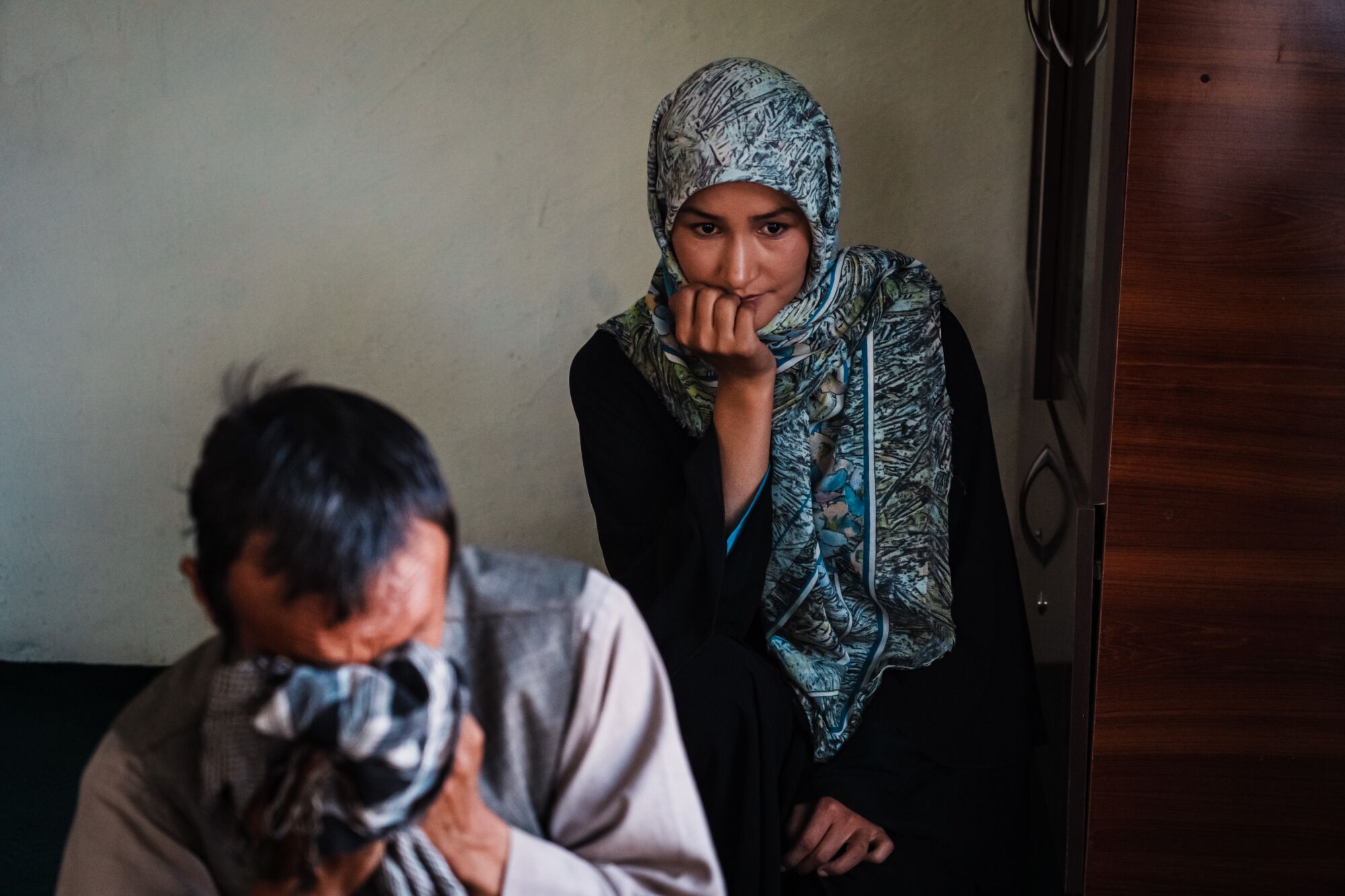
Meena Ibrahimi and her father, Mohammad Ibrahim Mohammadi, 46, tear up while talking about their experiences while at their home in Nawa Foladi, Afghanistan.
(Marcus Yam / Los Angeles Times)
Stay connected with us on social media platform for instant update click here to join our Twitter, & Facebook
We are now on Telegram. Click here to join our channel (@TechiUpdate) and stay updated with the latest Technology headlines.
For all the latest Education News Click Here
